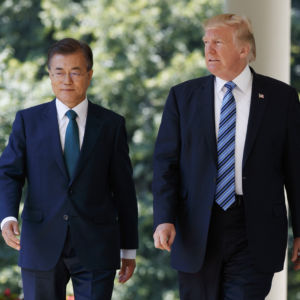SEOUL — Donald Trump faces obstacles when he gets here next week that have nothing to do with unruly mobs trying to shout loudly enough over mega-loudspeakers for him to hear them across rows of policemen in body armor.
No doubt Trump’s handlers will come up with the proper verbiage to reaffirm the historic bond between the two countries. Words and phrases like “ironclad” and “no daylight between us” come to mind. That’s the American equivalent to the weird Chinese “as close as the lips to the teeth.” Comforting statements gushing from the Trumpster and his entourage might remind us of another line, “The more things change, the more they remain the same.”
The first problem that needs covering up with bland cliches is simple: the United States and Republic of Korea leaders may not think alike on North Korea.
Yes, President Moon Jae-in has disappointed pro-Northers by supporting rather strong U.N. sanctions against North Korea. He has also gone along with the U.S.-ROK military exercises and intimidation flights of U.S. and South Korean warplanes across South Korea after North Korean nuclear and missile tests.
Moon draws the line, though, at talk by Trump, Defense Secretary Jim Mattis and others about holding out “the military option” against the North. You won’t hear Moon yakking about any “option” that might precipitate an artillery barrage across the Demilitarized Zone, much less a second Korean War. He’s absolutely against a “pre-emptive strike” to wipe out North Korea’s launch sites before Kim turns his wild threats into action.
Trump isn’t going to say, “Look, Mr. President, we’ve gotta do what we gotta do.” He’s going to assure Moon — on the best advice from Mattis, Secretary of State Rex Tillerson and national security adviser H.R. McMaster — that the United States is not thinking of doing anything without the full approval of the ROK.
There will, however, be some catches to the happy talk. Moon’s security adviser on unification is all for “freeze-for-freeze” ― the idea the United States and South Korea should halt the war games while the North suspends its nuclear and missile tests. Then, while both sides calm down, they should sit down and talk.
The Americans see that stream-of-consciousness as a hoax. While North Korea would go on doing whatever it wished, short of testing, the Americans and South Koreans would have their hands tied. Talks, if Kim Jong-un agreed to them at all, would barely go beyond the handshake stage since the North Koreans have said repeatedly, “If there’s one topic we’re not going to discuss, it’s our nuclear weapons program.”
Amazingly, after hearing that mantra so often, fantasists still don’t want to believe it. Let’s talk, they say, see what’s bothering Kim so much and come to comfortable terms.
Moon himself is not such a fantasist. He knows perfectly well there’s no point in talks with the North even if he’s getting differing shades of advice from members of his staff. There are, however, other pressing issues that are quite sensitive and may not be easily resolved.
What about OPCON, the acronym, in capital letters, for “Operational Control” of troops in time of combat? Right now the commander of U.S. Forces Korea is also the commander of the Combined Forces Command and the United Nations Command, a legacy from the Korean War that includes troops from 16 countries. Isn’t it about time to put a Korean four-star general in charge of CFC at least?
Senior Americans beat around the bush on that one. Mattis before leaving Seoul last weekend came up with this circumlocution. “We have an integrated process,” he said. “We are working together … the U.S. is assisting the ROK as we move forward on the issue.”

